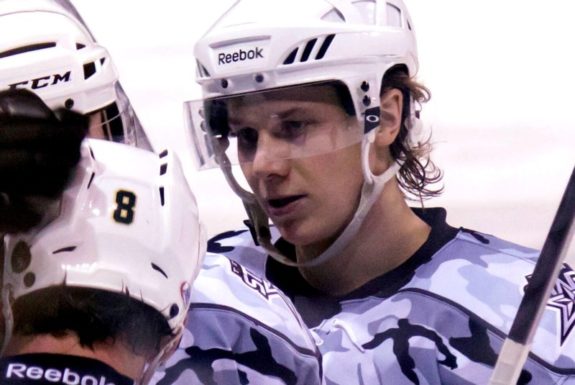In the summer of 2017, the NHL will introduce a new team from Las Vegas. The still-unnamed Vegas franchise will be joining the Pacific Division in the Western Conference and, as they construct their team, will be allowed to pluck one player from each current NHL roster. The Calgary Flames will be one of 30 NHL teams helping employ their direct competition.
Traditionally, expansion teams don’t fare well out of the gate. It can be difficult to put together high-end talent from other teams’ spare parts, so the NHL has created a set of expansion rules that will potentially leave some valuable players available. But, in an effort to be fair to pre-existing teams, the NHL has also put in place rules that offer some protection.

Calgary’s Automatically Protected List
Players on their first or second-year entry-level deals will not require protection as the NHL has not made them available for expansion. For example, a rookie draftee like Matthew Tkachuk, even if he plays all 82 games this upcoming season, is not available to Las Vegas. This protects NHL franchises from losing some of their most promising prospects during their developmental years.
So too, players with active “No Movement” clauses built into their contracts have to be protected and committed to by their NHL teams. In Calgary, Dennis Wideman is currently the only player with a nmc, but come next summer both Sean Monahan and Johnny Gaudreau may be on that list. Calgary should, (but also by rule, must) keep those two players protected.
Calgary’s Optional Protected List
NHL clubs will be allowed two options when it comes to protecting players. Option one is to protect three defensemen, seven forwards and a goaltender. Option two is eight total skaters and one goaltender. Different teams will take different approaches based on protecting their most talented assets, but Calgary will likely choose option one, seeing as they stand to lose more offensively than defensively.
The three defensemen seem obvious. Protecting Mark Giordano, Dougie Hamilton and TJ Brodie is a no-brainer. After that, losing any of the remaining defensemen on the Calgary roster won’t critically impact the team. One could argue that Jryki Jokipakka warrants protection, but that argument would need to be based both on Jokipakka’s production to date and protecting him at the expense of not protecting a forward. Neither case holds a lot of water.
Jokipakka came to Calgary as part of the Kris Russel trade to Dallas and at best he seems to be a young guy with potential. He posted six assists in 18 games with the Flames in 2015-16, averaging 15:34 minutes per game. His underlying numbers with the Flames weren’t great with a CF% of 46% and a relative Corsi of -3.4. In short, while Jokipakka could become a good player, he’s expendable and ultimately replaceable.
At forward, Calgary has much more to lose, thus protecting as many forwards as possible is the ideal option. Locks are Monahan, Gaudreau and Sam Bennett. More than likely are Troy Brouwer, Michael Frolik, Mikael Backlund and Michael Ferland. Of these seven forwards, one could argue the merits of protecting Ferland, but he likely warrants protection simply because Calgary can afford to. So too, the poor message sent in not protecting a player like Brouwer, with his shiny new contract and after only one year with the team, likely means he’s on the safe-list too.
In goal, the edge goes to newly acquired Brian Elliot. That edge may disappear based upon what both Elliot and slated backup Chad Johson do this upcoming season. Both are UFAs to end the upcoming season and both will be looking to cement themselves as the goalie of the Flames future.
Prediction
Calgary could be in a good spot. Some NHL teams stand to lose a significant player which will make the Las Vegas franchise remotely competitive. Even though this list suggests that players like Matt Stajan, Lance Bouma and Alex Chaisson will be exposed, Calgary is not one of those teams that stands to lose someone they can’t live without.
Unless the Flames add another piece over the summer, their roster, as it stands, is divided in such a way that the expansion rules play into their favour. No loss is detrimental including that of Jokipakka who, as a potential prospect, may be the player most likely taken.
Calgary should have no trouble going into the 2016-17 season with their core roster intact. They can also feel good that they won’t be supplying a division rival with a player who could ultimately come back to haunt them.